We have developed both an in-person mock convenience store (UNC Mini Mart) and an online experimental supermarket (Lola’s Grocery) to test the impact of a variety of policies and regulations in controlled, realistic environments.

The UNC Mini Mart, located at the UNC Center for Health Promotion and Disease Prevention, is a laboratory space designed and set up to resemble a convenience store. The store features two gondola shelves, a commercial refrigerator, and a register stand. Additionally, there is a separate waiting room and computer room for participants to complete online surveys. We have completed two studies in the UNC Mini Mart to evaluate taxes and warning labels on sugar-sweetened beverages. This store offers a realistic environment to test point-of-sale policies in a controlled location, allowing for improved understanding of the impact of these policies on the healthfulness of purchases.

Lola’s Grocery is our online experimental supermarket, developed using the Gorilla Experiment Builder, a platform developed by Cauldron Science, Ltd. Lola’s is designed to resemble one of the largest online grocery stores in the USA and includes more than 13,000 food and beverage products. In the store, participants can search for products or navigate using a variety of menu options. Products available in the store feature a product image, price, ingredient list, and nutrition facts. Various food retail policies can be easily implemented in the platform, such as taxes, warning labels, targeted discounts, and swaps. The online experimental supermarket gives researchers the ability to quickly modify conditions (i.e., look at many policies) and recruit large, representative sample sizes.
Since its launch, our team has used Lola’s Grocery to examine sugary drink warnings and perceptions of and exposure to toddler milk advertising among Latino parents.
